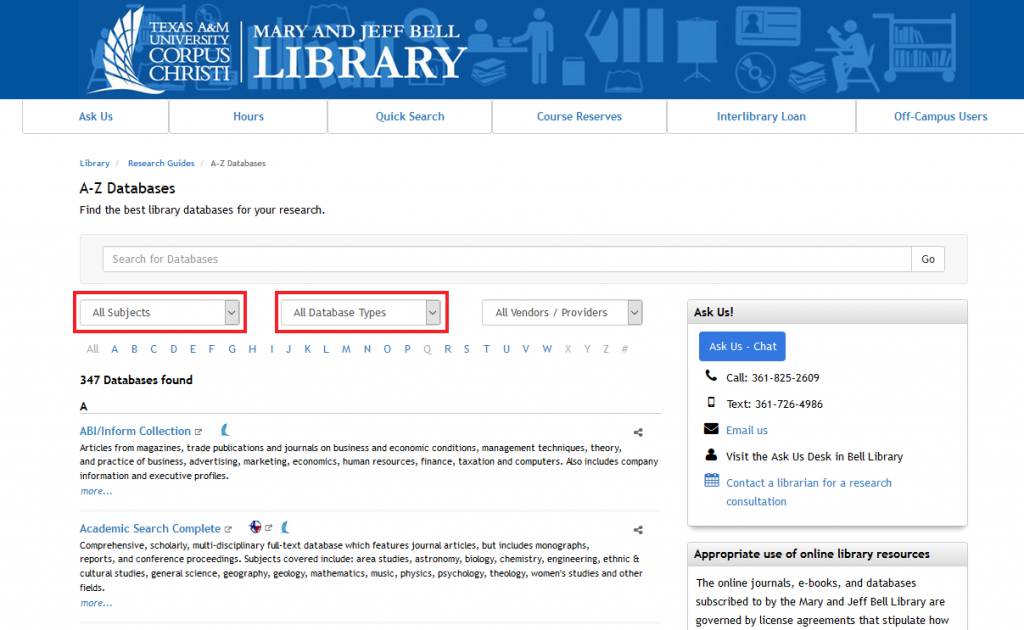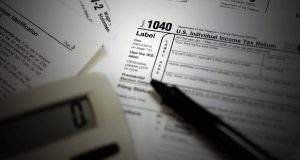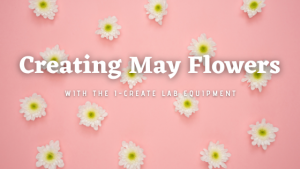One of the most frequent questions we get at the Ask Us Desk is “what database should I use?” This post is here to explain the basic makeup of databases, the options available to you, and how to go about picking one for your research needs.
What’s a database?
A database is essentially a container. Think of it like a box. Inside the box are a bunch of journals and in the pages of those journals are the articles people look for when they’re trying to compile research on a particular topic. So to access those journal articles, you open up the database box and search through the journals to find what you need.
A good example of a database is Amazon.com. It’s just a big ol’ database that contains not journals and articles, but sellers and items you can purchase. And just like a database, you usually search through Amazon using keywords just like you would a scholarly database.
One more component to this metaphor is the database provider. Essentially, these providers are even bigger boxes that hold several database boxes. Ebsco, for example is an aggregator database. It’s a really big company that does lots of things, only one of which is hosting different databases like CINAHL and Academic Search Complete. Ebsco also sells fishing gear if you’re interested.
What’re my options?
Bell Library subscribes to over 250 databases so your options are many and varied! Some of our databases hold different types of materials, like just newspapers or just movies (Netflix counts as a database, by the way! We have a similar database called Kanopy. Check it out!), while others are dedicated to subjects like History or Engineering.
Cool, but how do I pick one?
250+ is too many to skim through one by one reading database names and hoping one sticks out at you. Instead, check out these routes for narrowing down your database options.
Research Guides
Research Guides are the little pages librarians create for specific classes or subject areas. Every major discipline has a research guide with a list of databases that folks in that subject area tend to use frequently.
So if you’re writing a paper on interpretations of Jane Austen, you might need to look under the English guide. If you’re researching something like the connection between political figures and religious affiliation, it would probably be worth your while to check out both the Political Science guide and the Philosophy guide (which houses our religion databases).
On most of these guides, you’ll need to check out the left-hand menu and go to the “Find Articles” tab to find the list of databases that will likely contain the most relevant information for you. These lists of databases have been curated by the librarians who are dedicated to that particular subject, so you’ll always find a few good bets there.
Database list subject filter
If you don’t find what you’re looking for in a research guide, you can also go to the blue “Databases” button under the Quick Search box on the library’s homepage. This button will take you to a list of all the databases we have. From this page, click the drop-down arrow that says “All Subjects” and select the subject area you think most closely aligns with your research interests.
Sometimes you’ll find a database in several subject areas if it covers a broader scope of disciplines. The database “Science Direct,” for example, appears in not just Biology, but in Nursing and Health Sciences. This doesn’t mean the database isn’t good or specific, it just means it includes journals and articles from both disciplines.

Database list Type filter
If you need a type of source, like newspapers or primary sources or video, you can limit the databases displayed in the list by clicking the drop-down arrow next to the “All Database Types” menu. From here, you can select what kind of format you’re interested in.
Ask someone
If you’re curious what databases would be best for you, don’t be afraid to ask! Lots of people (maybe just professors and librarians) have favorite go-to databases where they start their research, so if you’re stumped, just ask.
If you don’t want to ask a professor or librarian, you can chat, call, or email someone at the Ask Us Desk. The desk is usually staffed with a student worker and a graduate assistant or a librarian, and they’re happy to help find the right database for you. Keep in mind, not all of us at the Ask Us Desk are experts in every field, and we may fall back on the Research Guides, too.
Still not sure?
If you’re refining your topic still or you’re not sure what kind of subject category you belong in, you can try searching in one of the more general databases, like Academic Search Complete. This way you might find a few articles to help guide the direction of your research. Then, if you need to, you can go into more specialized databases.
Now go forth and search!
Emily Metcalf
Instructional Services Librarian


